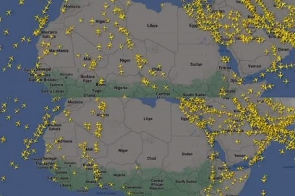The closure of the airspace of Niger by the military regime has led to a surge in the number of flights using Ghana’s airspace to get to various destinations.
AviationGhana’s analysis of live flight feed on Flightradar24 since the closure of the Nigerien airspace on August 6, 2023, shows mainly European carriers re-routing their flights via Accra, Ghana to major travel markets such as Nigeria, and other countries in Central and Southern Africa.
Mr. Francis Armah Mensah, President of the Ghana Air Traffic Controllers Association (GHATCA) confirmed this to AviationGhana.
“The closure of the Nigerien Airspace is having an impact on the Accra Flight Information Region. We have more traffic routing our airspace now than ever. The situation has increased the workload on Air Traffic Controllers. In terms of revenue, it will boost our revenue,” Mr. Mensah said.
The aviation sector regulator, Ghana Civil Aviation Authority (GCAA) is expected to gain from overflight charges.
Scheduled overflight for operators not operating into Ghana, costs US$150 (single request). All non-scheduled flights over the territory of Ghana are also required to obtain a permit at least 72 hours prior to the date of the intended flight and pay the same fee.
The closure of the Nigerien airspace, compounds flight challenges on the African continent, as Sudan and Libya remain a “no-fly” zone for international flights due to the instability in those countries.
The detours and re-routing of flights mainly from Europe to and from Sub-Saharan Africa have resulted in longer flight times and increased costs for airlines.
For instance, an additional one hour of travel time on a Boeing 777 means an additional 3,500 to 4,000 gallons of aviation fuel is needed to complete the journey.
At today’s cost of US$1.993 per gallon, this would mean an additional cost of between US$6,975 and US$7,972 to airlines. This may ultimately be passed on to consumers, resulting in higher airfares.
General News of Tuesday, 15 August 2023
Source: aviationghana.com













